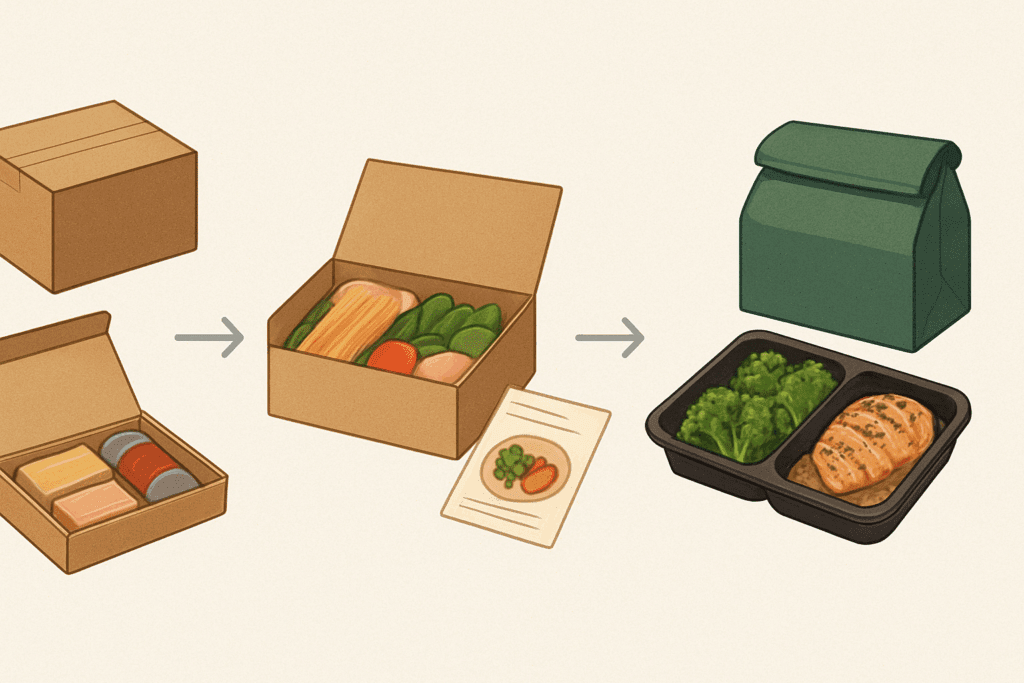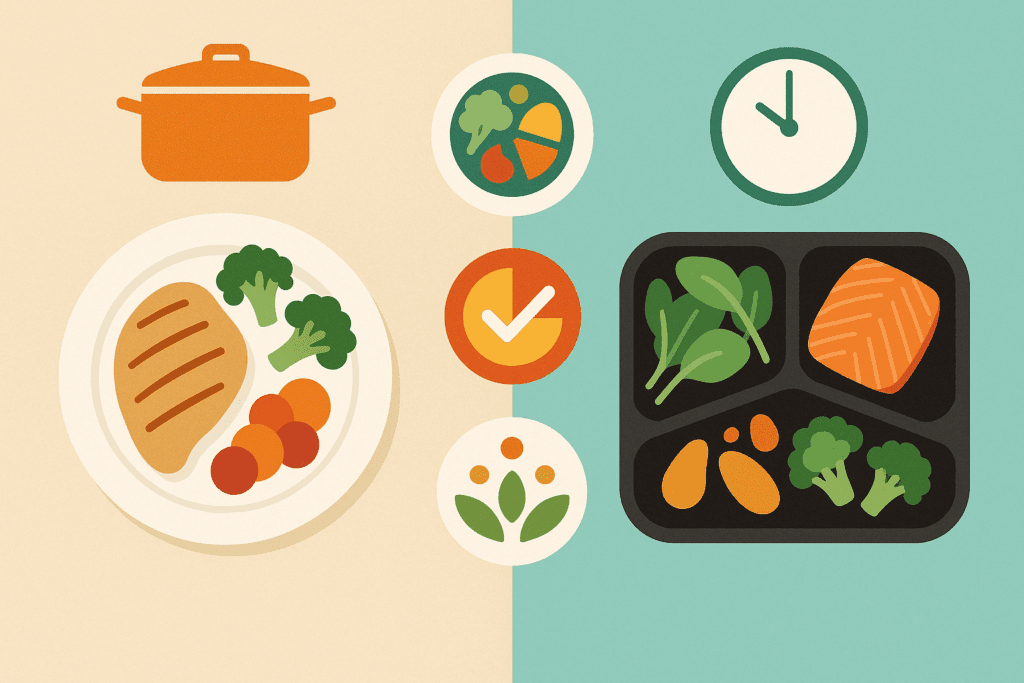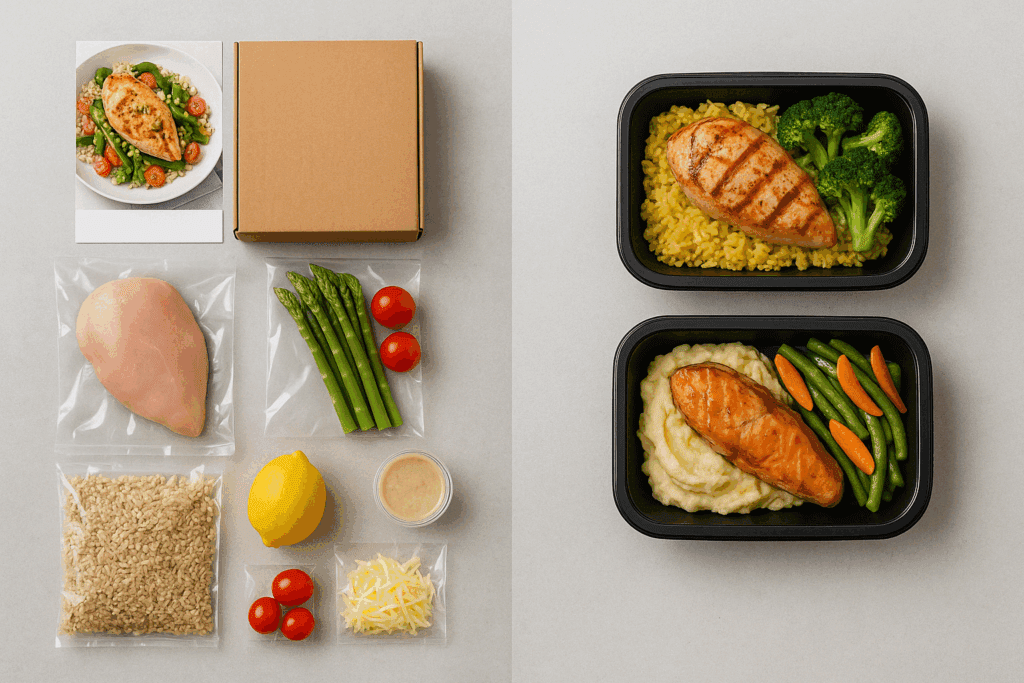In an increasingly fast-paced world, health-conscious individuals often find themselves caught between the desire to eat nutritious meals and the time constraints that prevent them from preparing food at home. The surge in demand for meal delivery services is no coincidence. With an abundance of options now available—ranging from gourmet meal kits to ready to eat meals—consumers are left asking a key question: are meal delivery services worth it? This article explores the answer in depth, evaluating the science, economics, and lifestyle impact of prepared meal delivery services while also comparing nutritional strategies like the ketogenic diet vs low carb alternatives.
You may also like: Smart Meal Prep for Weight Loss: Expert-Approved Lunch Ideas and Recipes to Stay on Track
The Evolution of Convenience: From Mail Order Food to Modern Meal Delivery
Meal delivery isn’t a new concept. In fact, its roots date back to the mid-20th century when mail order food options offered a novel solution for busy households. Today, the landscape has evolved dramatically. The best meal delivery companies now provide chef-curated menus, dietitian-approved meals, and farm-to-table freshness, all delivered to your door in insulated packaging that preserves nutrition and flavor.
This evolution reflects a shift in consumer expectations. People no longer want just convenience; they demand quality, variety, and alignment with their dietary goals. As a result, the top meal delivery services have risen to the occasion, offering customizable options for everything from plant-based diets to low carb meal plans.

Prepared Food Delivery and Nutrition: What Does the Science Say?
One of the most significant advantages of prepared food delivery is the ability to maintain dietary consistency. A major challenge in healthy eating is decision fatigue—a psychological phenomenon where the quality of our food choices declines after repeated decision-making. Prepared meals mitigate this by simplifying choices and providing portion-controlled, nutrient-rich food.
Recent research supports this advantage. A study published in Appetite (2021) found that individuals using structured meal plans or prepared meals were more likely to meet daily nutritional goals than those preparing meals independently. This is especially important for those following diets that require macronutrient precision, such as the keto diet.
This brings us to an important distinction in nutrition science: is keto a low carb diet, or something more restrictive? Technically, a ketogenic diet is a very low carb, high fat, moderate protein diet designed to induce ketosis. The broader category of low carb diets encompasses a spectrum of carbohydrate restriction. Understanding the difference in the context of prepared meals is essential, particularly for those choosing between the best meal delivery options tailored to keto or general low carb eating patterns.
The Economics of Time, Money, and Health
Cost is often cited as a barrier to trying the best prepared meal delivery service. At first glance, the price of $10 to $15 per meal may seem high compared to grocery shopping. But this perspective neglects a critical variable: time. Preparing a healthy meal from scratch involves planning, shopping, prepping, cooking, and cleaning—a process that can take upwards of 90 minutes.
When you account for the economic value of your time, the balance shifts. For busy professionals, parents, and caregivers, the hours saved by using prepared meal delivery services often offset the financial cost. Moreover, these services reduce the risk of relying on unhealthy fast food or takeout, which can carry long-term health costs. Over time, eating nutrient-balanced pre made meals may reduce medical expenses linked to diet-related conditions like obesity, hypertension, and type 2 diabetes.

Sustainability and the Rise of Local Meal Delivery Service Models
Sustainability has become a defining feature of consumer choices, and prepared food delivery is no exception. Many of the best meal delivery companies are adapting by sourcing ingredients locally, reducing packaging waste, and offering plant-based menu options. A local meal delivery service, in particular, minimizes transportation emissions and supports regional farmers, creating a more sustainable food system.
Prepared meals that focus on seasonal produce, whole grains, and legumes not only support environmental goals but align with mindful eating practices. These meals emphasize freshness, taste, and nutrition over hyper-processed ingredients. As more consumers embrace whole-food plant-based nutrition, prepared meal companies are responding with options that align with these values.
Are Meal Kits and Pre Made Meals Equal in Value?
It’s important to differentiate between meal kits and pre made meals when evaluating the best meal delivery service for your lifestyle. Meal kits include pre-portioned ingredients and recipe instructions, requiring the customer to cook the meal. These are ideal for those who enjoy cooking but want to skip meal planning and shopping.
In contrast, ready made meals and prepared meals arrive fully cooked. These meals are ideal for people with limited time, mobility issues, or simply those seeking a stress-free mealtime experience. Companies offering the best ready to eat meal delivery service typically emphasize quick reheating times, balanced macros, and gourmet flavors.
Among the best meal kits, some brands cater specifically to dietary preferences, such as gourmet meal kits that elevate the dining experience at home. Others focus on speed, simplicity, or health outcomes, creating a spectrum of options tailored to different consumer needs. Whether you’re asking which service like Factor is best for weight loss or searching for the cheapest meal prep service, there are choices that combine quality, value, and health benefits.
Comparing Diet Compatibility: Is Keto a Good Diet to Pair with Delivery Services?
One of the most common questions for health-conscious consumers is whether meal delivery services accommodate specific diets. For individuals considering low carbohydrate diets, it’s essential to explore the differences in ketogenic diet vs low carb programs.
So, is keto a low carb diet? Yes—but not all low carb diets are keto. The keto diet typically restricts carbs to fewer than 50 grams per day, while other low carb diets may allow up to 150 grams. This distinction matters when choosing prepared meal delivery services. Some services label meals as low carb but may not provide the precise macronutrient breakdown required for ketosis.
For those wondering, “is a keto diet sustainable?” research offers mixed results. While some individuals experience short-term weight loss and improved metabolic markers, long-term adherence can be challenging. The strict carb limits often require lifestyle adaptations that many people find difficult to maintain.
That said, prepared food delivery can make keto or low carb diets more manageable. Services that offer best food meal delivery service options with clear nutrition labels, portion control, and healthy fats can improve compliance and sustainability. For those asking “is keto no carbs?” the answer is no—the diet still includes carbs, but in very limited quantities.
Stress Reduction and Mental Health Benefits
Beyond the practical benefits of saving time and supporting dietary adherence, prepared meal delivery services offer psychological advantages. Meal prep fatigue is real, and the stress of daily cooking responsibilities can erode mental well-being. Choosing the best meal plan service can relieve this burden, making space for mindfulness, relaxation, or quality time with family.
Research from the American Journal of Lifestyle Medicine (2022) shows that reducing daily decision-making around food is associated with lower cortisol levels and improved mood. For individuals experiencing burnout, decision fatigue, or executive dysfunction, ready to eat meals can serve as a mental health tool, restoring emotional bandwidth.
Moreover, having consistent access to healthy food eliminates the guilt or frustration associated with skipping meals or defaulting to fast food. The best prepared meal delivery services provide both structure and spontaneity: the structure of consistent healthy eating and the spontaneity of diverse, rotating menus.

Affordability, Accessibility, and the Role of Cheap Meal Delivery Options
While gourmet meal kits and premium prepared meals offer an elevated experience, they may not be accessible to everyone. Fortunately, the rise of cheap meal delivery and cheap meal prep delivery options has democratized access to healthy food. Some of the best food delivery services now provide affordable plans, offering reduced portion sizes, budget-friendly ingredients, or local sourcing to lower costs.
It’s essential to evaluate affordability in terms of both direct and indirect costs. While $10 per meal may exceed the cost of home-cooked food, it may still be cheaper than a restaurant dinner or the long-term health cost of nutrient-deficient meals. In this way, even the cheapest meal prep service can contribute to a healthier lifestyle.
The most accessible services tend to prioritize pre made meals that are simple, wholesome, and free from added sugars or artificial preservatives. These meals often cater to people managing chronic conditions or recovering from illness, making them more than a luxury—they become a lifeline to better health.
Meal Delivery and Lifestyle Transformation: A Holistic View
When assessing whether meal delivery services are worth it, one must consider their holistic impact. Prepared food isn’t just about nourishment—it’s about creating space for intentional living. By outsourcing the labor of meal planning, grocery shopping, and cooking, individuals reclaim time and mental energy. This shift supports not only physical health but also emotional resilience and relational well-being.
For families, the best meal delivery service may offer a consistent dinner routine, eliminating the nightly struggle over what to cook. For seniors or individuals with disabilities, prepared meals provide independence and dignity. And for busy professionals, local meal delivery service providers offer a practical solution for eating well amid chaotic schedules.
When meal delivery becomes part of a broader health strategy—alongside movement, sleep, and stress management—its benefits become magnified. In such cases, asking “are meal delivery services worth it?” becomes less about dollars and more about the quality of life.

How to Choose the Best Prepared Meal Delivery for Your Needs
Navigating the crowded field of prepared meal delivery services requires a thoughtful approach. Key factors include nutritional transparency, ingredient quality, menu variety, and customization options. Services that provide access to a registered dietitian or allow you to filter by dietary needs—vegan, keto, gluten-free—tend to be more effective for long-term health goals.
Additionally, examine the environmental practices of each company. Are they minimizing packaging waste? Supporting local farms? Offering plant-based choices? Sustainability and ethics are increasingly central to what makes a service one of the best meal delivery companies.
Finally, consider your personal goals. Whether you’re managing blood sugar, training for a marathon, or simply hoping to stop skipping lunch, there’s a meal plan that fits your lifestyle. The best prepared meal delivery service will feel like a partner in your wellness journey, not a temporary fix.

Frequently Asked Questions: Are Meal Delivery Services Worth It?
1. How can meal delivery services help improve long-term eating habits beyond just convenience?
Meal delivery services do more than just save time—they can serve as a behavioral tool for reshapingeating habits. By regularly consuming balanced pre made meals, users naturally begin to understand portion control, meal timing, and ingredient variety. The best prepared meal delivery service often includes nutrient-dense ingredients that might otherwise be underutilized in a busy household. Exposure to a broader range of vegetables, legumes, and whole grains through prepared meals can nudge consumers toward healthier preferences. Over time, this shift can have a lasting impact on how individuals shop, cook, and even dine out, reinforcing more mindful eating behaviors long after the subscription ends.
2. What psychological benefits do people experience when switching to prepared food delivery?
Psychologically, the benefits of prepared food delivery extend into areas like reduced decision fatigueand improved mood stability. When mealtimes are no longer associated with the stress of planning or last-minute grocery runs, mental space opens for more intentional living. This can be especially beneficial for individuals managing anxiety, ADHD, or chronic stress, where executive function may make meal prep overwhelming. The best food delivery companies understand this and offer curated, easy-to-choose menus that eliminate unnecessary mental clutter. Additionally, the routine of enjoying ready to eat meals can create comforting rituals around nourishment and self-care.
3. Can meal delivery options support medical dietary needs or therapeutic nutrition plans?
Yes, top meal delivery services are increasingly accommodating complex medical and therapeuticdietary requirements. Whether it’s managing blood sugar with a diabetic-friendly plan or controlling sodium for hypertension, the best meal delivery service offerings now include filters for highly specific nutritional needs. Prepared meal delivery services often employ registered dietitians to ensure meals meet evidence-based guidelines. This makes them a valuable resource for patients seeking consistency in managing their health without compromising flavor. Even niche options like low-FODMAP or renal diets are beginning to appear within the best prepared food delivery service menus, offering medically sound alternatives to self-directed meal planning.
4. How do gourmet meal kits compare with traditional home-cooked meals in terms of nutrition and culinary creativity?
Gourmet meal kits are closing the gap between home cooking and restaurant-quality food by offeringchef-designed recipes that integrate nutrient-dense, fresh ingredients. While traditional home-cooked meals can be healthy, they often fall into repetitive patterns or rely on convenience shortcuts. In contrast, the best meal kit delivery service options prioritize seasonal produce, lean proteins, and globally inspired flavors, all of which help elevate the nutritional and sensory quality of a meal. The best meal kits not only introduce new culinary techniques but also provide an educational component, allowing users to build lasting cooking skills. As a result, gourmet meal kits foster creativity without compromising nutritional integrity.
5. Is there a significant difference between local meal delivery service models and national brands?
Local meal delivery service providers often offer fresher ingredients, faster delivery times, and asmaller carbon footprint due to reduced transit distances. They may also support regional agriculture by sourcing directly from local farms and producers. While national brands have the advantage of scale and consistency, local providers can cater to community-specific tastes, allergies, or cultural dietary preferences. Additionally, local prepared meal delivery services often focus on small-batch cooking, which can mean fewer preservatives and a more artisanal approach to food preparation. For those seeking a more personalized and environmentally conscious choice, local options can rival or exceed the quality of the best meal delivery companies.
6. What innovations are emerging in the best meal prep services market that enhance user experience?
Recent innovations in the best meal prep services sector include AI-based personalization enginesthat curate weekly menus based on individual taste profiles, health goals, and even biometric feedback from wearable devices. Some prepared food delivery services are integrating nutrition-tracking apps, allowing users to sync meals directly to platforms like MyFitnessPal or Apple Health. Augmented reality cooking tutorials are also becoming popular with best meal kits, guiding users step-by-step with immersive digital interfaces. In the future, we can expect the best meal plan service options to integrate climate impact scores and farm-to-fork transparency to help consumers make more ethical food choices. These advancements make it easier than ever to access gourmet-level nutrition with the touch of a button.
7. How can prepared meals reduce food waste compared to home cooking or dining out?
Prepared meals are precisely portioned and pre-packaged, which significantly cuts down on spoilageand over-purchasing, two major contributors to household food waste. The best prepared meal delivery service options design their menus with ingredient efficiency in mind, meaning fewer unused items sitting in your fridge. Unlike bulk shopping for recipe-specific ingredients, which may lead to wasted herbs or specialty items, pre made meals provide exactly what you need. Dining out also contributes to waste through oversized portions and excess packaging. With prepared food delivery, consumers can align with sustainability goals without compromising on convenience or taste.
8. Are there affordable options within the best meal delivery landscape for budget-conscious consumers?
Absolutely. While some best meal delivery companies specialize in gourmet or organic offerings,others prioritize affordability without sacrificing quality. The cheapest meal prep service plans often utilize staple ingredients like beans, rice, and seasonal produce to reduce costs while maximizing nutritional density. Many providers also offer smaller portion sizes, fewer meals per week, or local-only plans that reduce transportation expenses. Platforms offering cheap meal prep delivery may additionally incentivize bulk ordering or recurring subscriptions to make the cost more manageable. Consumers looking for the best food meal delivery service that fits within a budget can now find several competitively priced options that still uphold high health and safety standards.
9. How does subscription flexibility impact the value of a prepared meal service?
Flexibility is increasingly becoming a defining feature of the best meal service platforms. Being able toskip weeks, pause subscriptions, or change meal quantities based on your schedule adds tremendous value for users with fluctuating routines. Some of the best prepared meal delivery services also offer seasonal menu changes or limited-time gourmet meal kits, keeping the experience dynamic and engaging. A prepared meal delivery service that supports customization—not only in ingredients but also in frequency and budget—provides better alignment with long-term user satisfaction. This adaptability ensures that users don’t feel locked into rigid plans, making it more likely they’ll stick with healthy eating habits over time.
10. What factors should you consider when deciding which service like Factor is best for your lifestyle?
When choosing which service like Factor is best, consider several dimensions: nutritionaltransparency, meal variety, ingredient sourcing, and customer service responsiveness. Beyond taste and convenience, the best meal delivery service for your lifestyle should reflect your health priorities, whether that means plant-based proteins, low-sodium options, or high-fiber meals. Additionally, review whether the service offers best ready to eat meal delivery service options versus meal kits requiring preparation—each suits different routines and cooking preferences. Also, assess the user interface of the ordering platform, customer reviews, and the ability to track meals for fitness goals. The best prepared food delivery service for one person may not be the right fit for another, so identifying your personal needs is key to making the most of what prepared meal delivery services offer.

Conclusion: Why the Best Prepared Food Delivery Service May Be the Smartest Choice for Modern Living
The decision to embrace prepared meal delivery is ultimately a personal one, shaped by budget, health goals, time constraints, and culinary preferences. Yet, the evidence is increasingly clear: for many individuals, the best prepared food delivery service is more than convenient—it’s transformative.
By supporting consistent nutrition, reducing stress, and simplifying mealtime, these services empower individuals to live more mindfully and healthfully. For those exploring specific dietary approaches, such as low carb or keto eating, having access to ready made meals that are accurately portioned and labeled makes adherence far more realistic. And in a world where decision fatigue and burnout are common, outsourcing meal planning is a powerful act of self-care.
So, are meal delivery services worth it? If they support your health, respect your time, align with your values, and elevate your daily life, the answer may be a resounding yes.
Whether you’re seeking the best meal delivery, the cheapest meal prep delivery, or wondering which service like Factor is best, the choices are abundant—and the potential benefits go far beyond your plate.
Was this article helpful? Don’t let it stop with you. Share it right now with someone who needs to see it—whether it’s a friend, a colleague, or your whole network. And if staying ahead on this topic matters to you, subscribe to this publication for the most up-to-date information. You’ll get the latest insights delivered straight to you—no searching, no missing out.
Further Reading:
Are Meal Delivery Services Worth It? The Pros and Cons
Do meal delivery services deliver healthy home-cooked food at your doorstep?
Is meal kit delivery service worth it? (Hello fresh, Blue Apron…)
Disclaimer
The information contained in this article is provided for general informational purposes only and is not intended to serve as medical, legal, or professional advice. While NewsHealthWatch strives to present accurate, up-to-date, and reliable content, no warranty or guarantee, expressed or implied, is made regarding the completeness, accuracy, or adequacy of the information provided. Readers are strongly advised to seek the guidance of a qualified healthcare provider or other relevant professionals before acting on any information contained in this article. NewsHealthWatch, its authors, editors, and contributors expressly disclaim any liability for any damages, losses, or consequences arising directly or indirectly from the use, interpretation, or reliance on any information presented herein. The views and opinions expressed in this article are those of the author(s) and do not necessarily reflect the official policies or positions of NewsHealthWatch.

